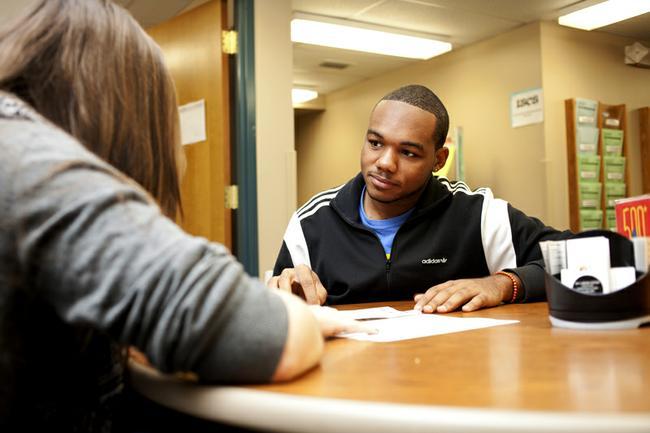Entry-level jobs now require much more than a degree. What used to be acceptable accreditation now buffers the internship experience expected in today’s job market.
Students are again faced with the pressures of being a step above the rest. Students must explore every avenue offered so they are prepared to head into the workforce upon graduating.
One avenue many students choose to explore is an internship.
“Students who complete internships during their college years have a much better chance of finding full time employment after graduation than students who don’t complete internships,” said Yair Riemer, vice president of global marketing at Internships.com.
Not only do internships give the student a taste of what to expect in their chosen career, they show future employers what the student is capable of doing, Riemer said.
“According to a study conducted by NACE, the National Association of Colleges and Educators, seven out of every 10 students who complete an internship get offered a permanent job with that same company after graduation,” Riemer said.
Dutchinternship.com presents internship experience as benefiting both the student and the employer. The website states taking on an intern cuts down on recruitment costs, meanwhile providing the intern with lifelong skills necessary to advance in their industry.
“One of the benefits of an internship is the fact that your employers do expect good work, but they know you’re trying to learn,” senior Jessica Cullen said. “Having a good teacher and boss is pivotal in making an internship beneficial.”
A general search on Careeroverview.com showed a bachelor’s degree will fulfill the minimum requirements but experience increases one’s chances of being hired.
Cullen is one of many students who have taken on unpaid internships throughout their collegiate experience.
“I started getting internships the summer after freshman year,” Cullen said. “The sooner the better because your internships really build on you.”
Cullen interned for KGAN, a CBS affiliate station located in Cedar Rapids, Iowa, the Associated Press and for the United States Olympic committee’s USA Wrestling Communication Department.
Two of her three internships were unpaid. However, she said her prior internship experiences lead to her position as a paid intern for the U.S. Olympic Committee.
“All of my experiences were incredibly beneficial,” Cullen said. “Everyone has different strengths and you really start to discover this in real-world experience.”
There is a big difference between a paid internships and one that is unpaid or for credit. Flexibility in scheduling, expected time commitments and the given workload revolve around these factors, according to Internships.com
“Students should think critically, prioritizing paid opportunities, and really learn about the programs available,” Internmatch.com co-founder Nathan Parcells said.
Internships.com offers a breakdown of how the internship works and what to expect.
Although a paid internship is more visually appealing, they require a 30- to 40-hour workweek. Because the intern is on the same level as the employees, the intern is given a consistent work schedule and a vast workload. Paid internships are few and far between, marking them as competitive opportunities, according to Internships.com.
“Internships are competitive as we are looking for the future leaders of our organization,” Kohl’s University Relations manager Amy Grinnell said. “It’s an incredible advantage for a student to understand exactly what the role looks like that they would be stepping into upon graduation.”
Paid opportunities are competitive for many reasons: not only does the salary make the intern a member of the staff, but it allows for the intern to be noticed by the employer.
The alternative is an unpaid internship, an option that is often overlooked by students due to the lack of imbursement, Parcells said. Unpaid internships are often more flexible in scheduling because the employer understands that since no compensation is being offered. The intern may have an additional part-time job. Depending on the industry, unpaid or for-credit internships typically have a shorter workweek.
Choosing between the two presents a controversial discussion: Are unpaid internships lawful, and how should they be approached?
This has been an ongoing debate, gaining considerable media attention over the years.
The U.S. Department of Labor has a set standard that must be met by employers in order to have a legal unpaid internship. Laid out in a six-fold format, this standard holds that the employer must be providing the intern with an educational experience that does not directly profit the company.
If the company does not comply with these guidelines, they may face legal action should the intern decide to file a complaint, according to the U.S. Department of Labor.
“Most internships should be paid — it is the legal and fair thing to do,” Parcells said. “An unpaid internship needs to be exceptionally educational and focus on helping the intern learn about the industry.”
Not only is the legality in question, but socioeconomic concerns are also being raised, according to a New York Times article. Although the experience is invaluable, in the current economic situation many students cannot afford to work without pay.
Because of this, many students who are at a financial disadvantage do not gain this experience. To offset this, students can save up in advance or, if possible, work a part-time job in addition to the internship, the article stated.
“Depending on the industry, unpaid internships may be the best way to break into the field,” Parcells said. “Make sure you are getting what you want out of the opportunity.”
Students must juggle making money and obtaining experience along with course work.
“Making money gets you to the next stop,” sophomore Bethany Christo said. “You learn how to deal with people when they are dissatisfied, and how to juggle many things at once.”
General work experience can also help students prepare for the “real” world.
“Hopefully, if they can come away from it knowing how to work on a team,” Shakespeare’s Pizza head cheese Kurt Mirtsching said. “And to be able to do a good job even when their life outside of Shakespeare’s isn’t going well, then they’ll come away with more than just a paycheck.”
Experience, in any form, can elevate a student’s chances of employment later.





